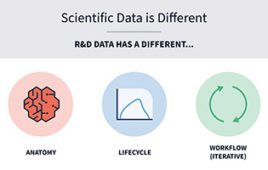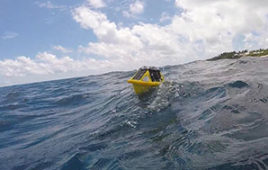 A new global science competition is challenging technology experts and researchers to develop products and services that harness the power of big data to improve health. The National Institutes of Health and the Wellcome Trust have partnered to launch the contest to advance open science — a movement to make scientific research data broadly accessible to the public — including publications, datasets, codes and other research outputs. An initial list of data resources to illustrate the types of content and data teams might utilize in their innovations is available on www.openscienceprize.org.
A new global science competition is challenging technology experts and researchers to develop products and services that harness the power of big data to improve health. The National Institutes of Health and the Wellcome Trust have partnered to launch the contest to advance open science — a movement to make scientific research data broadly accessible to the public — including publications, datasets, codes and other research outputs. An initial list of data resources to illustrate the types of content and data teams might utilize in their innovations is available on www.openscienceprize.org.
The volume of digital information generated by biomedical research — big data — is growing at a rapidly increasing pace, and researchers’ ability to derive knowledge from data is hindered by their ability to find, access and use it. The goal of the Open Science Prize is to “support the development and prototyping of services, tools and platforms” to overcome these hurdles and to ensure that data can be used to “advance discovery and spur innovation.”
This first round of the Prize consists of a two-phase competition. For the first phase, up to six international teams will compete for funding to take new ideas for products or services to the prototype stage, or to further develop an existing early-stage prototype. Up to six prizes of $80,000 each will be awarded to successful teams to develop their innovation over an eight to nine-month period.
The first phase of the competition is accepting applications through February 29, 2016. Six teams will be selected based on the advice of a panel of experts to receive the prize money to advance their ideas to prototypes, and will be required to submit their prototypes by December 1, 2016.
The panel of expert advisors includes Tim Clark of Harvard Medical School and Massachusetts General Hospital, Michael Eisen of the University of California at Berkeley, Mark Hahnel from figshare, Heather Joseph from SPARC, Maria Fabiana Kubke of the University of Auckland, Brian Nosek of the University of Virginia and the Center for Open Science, Ida Sim of the University of California, San Francisco, and Kaitlin Thaney of Mozilla Science Lab.
In the second phase, the phase I prize recipient judged to have the prototype with the greatest potential to advance open science will receive a prize of $230,000.
The Open Science Prize is made possible through a Memorandum of Understanding between NIH and Wellcome Trust. The Howard Hughes Medical Institute, Chevy Chase, MD, is also contributing funds to Wellcome Trust for the effort.
“As an early advocate of open access and data sharing, the Wellcome Trust believes passionately in the power of freely available, reusable research outputs,” said Jeremy Farrar, O.B.E., FMedSci, FRS, director of the Wellcome Trust. “With the Open Science Prize, we hope to tap into the innovative spirit of the global open science community to use open data to deliver global health benefits.”
The NIH effort is part of the Big Data to Knowledge (BD2K) Initiative, launched in 2012 as a trans-NIH program with funding from all 27 institutes and centers, as well as the NIH Common Fund. BD2K’s mission is to “enable biomedical research as a digital research enterprise, to facilitate discovery and support new knowledge, and to maximize community engagement.”
“Research is a global, data-driven enterprise, and our ability to improve health increasingly hinges on our ability to manage and make sense of the enormous amounts of data being produced by scientific research,” said NIH Director Francis S. Collins, M.D., Ph.D. “I expect the Open Science Prize to generate innovative ideas to improve data access and establish new international collaborations that will illustrate the transformative power of sharing research data.”
The funders will hold a webinar on December 10, 2015 (11:00 EST; 16:00 GMT) to further discuss the Prize with potential entrants and answer questions. Click here to register.
The overall winner is expected to be selected on February 28, 2017.
Full competition schedule
- Webinar for potential entrants: December 10, 2015
- Deadline for entrants for phase I prize: February 29, 2016
- Judging completed and phase I prizes awarded: April 30, 2016
- Deadline for phase II applications (for phase I prize recipients): December 1, 2016
- Phase II prize winner announced: February 28, 2017
About the Wellcome Trust
The Wellcome Trust is a global charitable foundation dedicated to improving health, providing more than £700 million a year to support “bright minds in science, the humanities and the social sciences, as well as education, public engagement and the application of research to medicine.”
About the Howard Hughes Medical Institute
The Howard Hughes Medical Institute plays a powerful role in advancing scientific research and education in the United States. Its scientists, located across the country and around the world, have made important discoveries that advance both human health and our fundamental understanding of biology. The Institute also aims to transform science education into a creative, interdisciplinary endeavor that reflects the excitement of real research.
About the National Institutes of Health (NIH)
NIH, the nation’s medical research agency, includes 27 Institutes and Centers and is a component of the U.S. Department of Health and Human Services. NIH is the primary federal agency conducting and supporting basic, clinical, and translational medical research, and is investigating the causes, treatments, and cures for both common and rare diseases.
- More information about the Open Science Prize can be found at: http://openscienceprize.org.




